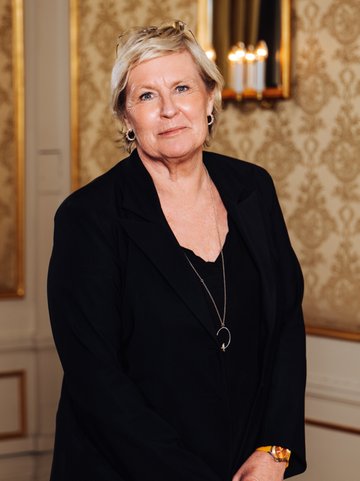2021 Medicine Prize
Karin Pettersson
Jury motivation: "Dr Karin Pettersson has successfully worked to ensure that women with spinal injuries can become pregnant and carry a normal pregnancy to term. In addition to this, she has also, throughout her professional life, advocated for an increased awareness in intrauterine fetal demise."
About Karin Pettersson
Dr Karin Petterson is Chief Physician and Reader in obstetrics and gyneacology at Karolinska University Hospital. She has a long experience of pregnancies and child birth in high risk patients, such as patients with infections, HIV and COVID-19.
Dr Pettersson has been an advocate for women with spinal injuries. She has worked to ensure that women with spinal injuries can become pregnant and carry a normal pregnancy to term. This has been done very successfully and she has helped many women become mothers with her support.
Dr Pettersson has, throughout her career, been an active advocate for increased knowledge about intrauterine fetal demise. She is a desired expert and active in the working group for perinatology within the Swedish Association for Obstetrics and Gynaecology, as well as an expert in the Patient Claims Panel.
Karin Pettersson battles prejudice against pregnant women with HIV
Most women with infectious diseases such as HIV can give birth to healthy children. But because of ignorance, they still face prejudice, even in their encounters with health care. The 2021 Mogren Prize awardee, Dr Karin Pettersson, has spent her career working with complicated pregnancies, where the stigma can be a bigger obstacle than the infection itself.
“”Is it really wise for you to carry a child?” This is a question many women with infectious diseases are asked, but it is so much more than just a question. It causes suffering and is built on complete ignorance,” says Dr Pettersson.
Dr Pettersson is a Reader, an obstetrician specialised in childbirth and Head of Section at Karolinska Hospital in Huddinge. She has a long experience of pregnancy and childbirth in high-risk patients, such as HIV-positive pregnancies and those with other infectious diseases, spinal injuries, and COVID-19. In 2021, she was awarded the Mogren Medicine Prize for her work.
“It’s important to remember that the majority of all women with infections such as HIV have completely uncomplicated pregnancies and can give birth vaginally without infecting their children,” Dr Petterson says.
She sees clear gaps in knowledge, both among healthcare professionals and the general public, about what it actually means to be pregnant with a condition. This became especially clear during a conversation with a woman with a serious neurological condition.
“When she told people that she was meeting me to talk about the possibility of getting pregnant, she was met with pushback. These opinions hurt her so much, and they came from people who actually don’t know this field,” says Dr Pettersson.
To increase knowledge, Dr Pettersson teaches medical students about infections and pregnancy. Very often, she finds that even the students are completely new to the subject. This is concerning, but at the same time the opportunity to connect with new students is a chance to do something about the knowledge gap.
“With a high level of skills, it’s possible for almost all women to go through a pregnancy and birth that results in a healthy mother and a healthy child. We need to focus on skills acquisition!”
The fight for a decent work environment for midwives
Dr Pettersson has been an active clinician and researcher for more than 20 years. She has witnessed a worrying deterioration in the work environment. Staff shortages within labor and delivery is becoming more and more critical.
“In ten or twenty years, there is a risk that there will be no nurses, no midwives, and perhaps no doctors to meet the healthcare needs of the hospitals. If we want to avoid a critical situation, we need to act now,” says Dr Pettersson.
Fewer midwives mean less support before and during childbirth. This could create fear of childbirth among expecting mothers, which in turn could lead to increased demand for staff. At the same time, it increases the midwives’ stress, which means that they may be forced to act on concern and fear, Dr Pettersson explains.
“We have to allow more time for each patient, otherwise we risk subjecting women to unnecessary interventions such as vacuum extraction or caesarean sections. We will also not be able to retain our midwives – they will change profession and that is the last thing we want.”


